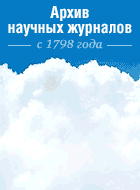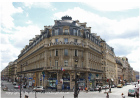Другие журналы
scientific edition of Bauman MSTU
SCIENCE & EDUCATION
Bauman Moscow State Technical University. El № FS 77 - 48211. ISSN 1994-0408
# 05, May 2015
Machine Building and Engineering Science
Identification of Hydrodynamic Characteristics of the Spool-type Valve
# 05, May 2015
DOI: 10.7463/0515.0773060
# 05, May 2015
DOI: 10.7463/0515.0773060
pp. 26-39
Numerical Simulation of a Grinding Process Model for the Spatial Work-pieces: Development of Modeling Techniques
# 05, May 2015
DOI: 10.7463/0515.0766577
# 05, May 2015
DOI: 10.7463/0515.0766577
pp. 40-58
Dynamic Model of Platform Manipulator with Six Degrees of Freedom
# 05, May 2015
DOI: 10.7463/0515.0771033
# 05, May 2015
DOI: 10.7463/0515.0771033
pp. 59-81
Mathematics and Mathematical Modeling
Quasi-Stationary Temperature Field of Two-Layer Half-Space with Moving Boundary
# 05, May 2015
DOI: 10.7463/0515.0775760
# 05, May 2015
DOI: 10.7463/0515.0775760
pp. 126-136
Instrument Engineering, Metrology and Information-Measuring Devices and Systems
Adaptation of the Neural Network Recognition System of the Helicopter on Its Acoustic Radiation to the Flight Speed
# 05, May 2015
DOI: 10.7463/0515.0776347
# 05, May 2015
DOI: 10.7463/0515.0776347
pp. 137-153
Digital Auto-Oscillator of a Dithering Ring Laser Gyro
# 05, May 2015
DOI: 10.7463/0515.0766380
# 05, May 2015
DOI: 10.7463/0515.0766380
pp. 154-177
Theoretical Study of Amplitude Modulation Application during Radio Frequency Electrocoagulation
# 05, May 2015
DOI: 10.7463/0515.0766262
# 05, May 2015
DOI: 10.7463/0515.0766262
pp. 178-189
Radio Engineering and Communication
Ultra-Wideband Printed Slot Radiators with Controllable Frequency Characteristics
# 05, May 2015
DOI: 10.7463/0515.0766224
# 05, May 2015
DOI: 10.7463/0515.0766224
pp. 190-204
Informatics, Computer Science and Management
Heat Conductivity of Composite Materials with Included Balls of Zero Heat Conductivity
# 05, May 2015
DOI: 10.7463/0515.0776224
# 05, May 2015
DOI: 10.7463/0515.0776224
pp 205-217
Stabilization Algorithms for Automatic Control of the Trajectory Movement of Quadcopter
# 05, May 2015
DOI: 10.7463/0515.0771076
# 05, May 2015
DOI: 10.7463/0515.0771076
pp. 218-235
A Linearization Algorithm of the Redundant Mechanical Structures
# 05, May 2015
DOI: 10.7463/0515.0770391
# 05, May 2015
DOI: 10.7463/0515.0770391
pp. 236-250
Dual-System Symbolic Computational Model of Artificial Grammar Learning
# 05, May 2015
DOI: 10.7463/0515.0766407
# 05, May 2015
DOI: 10.7463/0515.0766407
pp. 251-265
Optics
Testing the Secondary Mirror Surface Form of a Radiotelescope «Millimetron»
# 05, May 2015
DOI: 10.7463/0515.0770424
# 05, May 2015
DOI: 10.7463/0515.0770424
pp. 297-308
Scattering Light by а Cylindrical Capsule with Arbitrary End Caps in the Rayleigh-Gans-Debye Approximation
# 05, May 2015
DOI: 10.7463/0515.0768602
# 05, May 2015
DOI: 10.7463/0515.0768602
pp. 309-318
Engineering Geometry and Computer Graphics
Geometric Transformations in Engineering Geometry
# 05, May 2015
DOI: 10.7463/0515.0770568
# 05, May 2015
DOI: 10.7463/0515.0770568
pp. 334-347
Power Engineering
Experimental Study of Thermo-hydraulic Characteristics of Surfaces with In-line Dimple Arrangement
# 05, May 2015
DOI: 10.7463/0515.0776160
# 05, May 2015
DOI: 10.7463/0515.0776160
pp. 348-369
Economic Sciences
Methods for Engineering Enterprise Management Based on the Inter-factor Productive-Economic Relations
# 05, May 2015
DOI: 10.7463/0515.0768581
# 05, May 2015
DOI: 10.7463/0515.0768581
pp. 370-379
Appendix
Foreign Education
SWITZERLAND: “Outward Looking” Universities Boost Sector Rankings
# 05, May 2015
# 05, May 2015
Switzerland’s higher education system has been ranked second in the 2015 Universitas 21 global ratings, standing out on the criterion of ‘international outlook’. However, this is the area under threat after an anti-immigration vote last year.The ranking differs from more conventional university rankings such as those from the Times Higher Education and Shanghai – in which Swiss universities typically make the top 20 or 40 – in that it considers the higher education system as a whole. Universitas 21, or U21, project leader Ross Williams, who is based at the University of Melbourne, said: “The secret to Swiss success seems to be that its universities are very outward looking: they have strong links with industry and business and with other international researchers.”
EUROPE: Language Laws Repress Many Universities
# 05, May 2015
# 05, May 2015
The rector of Maastricht University, the second youngest university in the Netherlands, claims that universities in Europe are being choked by the laws that compel them to use their native language as the medium of instruction instead of English.Professor Luc Soete said that international conventions emphasise that it is the human right of undergraduates to be taught in their native language. This means that educational institutions can only offer courses taught in English if the same courses are offered in the country’s native language.
MALTA: Requirements Reduced for Academic Institutions to Become Universities
# 05, May 2015
# 05, May 2015
Recent changes to the Education Act have resulted in lower requirements for educational institutions to be recognised as universities.The changes in the country's education legislation were introduced in a Legal Notice published just three days after the Heads of Agreement was signed between the government and the Jordanian Sadeen Group, which is investing in the American University of Malta.Among those changes, a new proviso allows an accredited higher educational institute to apply for university status if the National Commission for Further and Higher Education "considers that such application is in the national interest and in fulfilment of national policies"."Changes in legislation reflect government policy, which promotes the pluralistic provision of further and higher education in Malta," the Education Ministry stated in reply to this newspaper's questions on the new legislation.
EU edges Closer to Higher Education Targets
# 05, May 2015
# 05, May 2015
Eurostat figures have revealed that the European Union is edging closer to its Europe 2020 target in education, writes Peter Taberner for Prague Post.The share of people who have attended a tertiary education college or equivalent, has risen from 23.6% in 2002, when the series started, to 37.9% in 2014, for those between the ages of 30 and 34. Women have benefited the most from this increasing trend, as 42.3% have now been university educated or completed a course at a higher technical education institution, up to last year. The latest figures have confirmed a 17.8% rise in learning achievement for women compared to 2002, as back then 23.6% had completed tertiary education courses.
EUROPE: Language Accreditation up in Universities
# 05, May 2015
# 05, May 2015
Europe’s leading quality monitoring organisation in language education, EAQUALS, has seen growing interest from universities keen to accredit courses in foreign languages as they aim to internationalise campuses, writes Sara Custer for The PIE News.EAQUALS, or Evaluation and Accreditation of Quality in Language Services, Executive Director Sarah Aitken said that universities now make up about a quarter of total enquiries to the organisation which has traditionally served private language education providers. Currently just three universities are part of EAQUALS’ 25 accredited members and 26 associate members.
INDIA: Bigger Role for Adjunct Faculty in Universities
# 05, May 2015
# 05, May 2015
Indian universities and higher education institutions which are facing acute shortages of teachers can now fill up to 25% of sanctioned posts with adjunct faculty drawn from industry, non-resident Indians, public sector undertakings, working and retired officers of central and state civil services and even from non-governmental organisations, writes Kanchan Srivastava for Daily News & Analysis.These professionals need not even meet the educational qualification criteria as prescribed by the University Grants Commission, or UGC, for the post of professor. Their special skills and domain knowledge will be enough to qualify them to become adjunct faculty in universities and colleges, say recent guidelines issued by the UGC for employment of adjunct faculty.
TURKEY: Government Imposes Stiff Standards for Study Abroad
# 05, May 2015
# 05, May 2015
Turkish students who study abroad must do so at a top-500 ranked university or take the domestic higher education entrance exam in order for their qualifications to be recognised by the government, under new regulations put in place by the Higher Education Council of Turkey, known as YÖK, writes Beckie Smith for The PIE News.The new regulations, which apply only to undergraduates, have been sparked by a large number of complaints to YÖK that students had been accepted onto substandard courses abroad that were being taught by unqualified staff, it said in a statement. “Students who could not gain a place at a Turkish university have easily received offers abroad without much effort. This has damaged public morale.”
History of Progress
In Memory of Alexander S. Popov (1859 – 1905)
# 05, May 2015
DOI: 10.7463/0515.0778161
УДК: 929
# 05, May 2015
DOI: 10.7463/0515.0778161
УДК: 929
A brief overview of the life and work of state councilor A.S. Popov, a prominent Russian physicist and electrical engineer, inventor of the radio. The information about the parents and surname Mr. Popov tree, interesting facts from his life and work, details of education at St. Petersburg University, Teaching in a Mine officer class Kronstadt, family life, participation in the Nizhny Novgorod Fair, creative work and career. Particular attention is paid to chronicle achievements A.S. Popov from the creation of storm indicator to the first models electronic equipment manufactured in the workshop E.V. Kolbasiev, its manufacturing joint venture "Popov-Ducretet" and the tests during a rescue operation in the Gulf led by Vice-Admiral S.O. Makarov and warships of the Russian Navy, in conjunction with P.N. Rybkin and the D.S. Troitsky. The basic signs of attention devoted to memory A.C. Popova, including plaque IEEE Miltstone. The application provides information about the French engineer and entrepreneur Eugene Ducretet and the Paris World Ex-hibition of 1900, Awards A.S. Popov Gold Medal.
| Authors |
| Press-releases |
| Library |
| Conferences |
| About Project |
| Phone: +7 (915) 336-07-65 (строго: среда; пятница c 11-00 до 17-00) |
|
||||
| © 2003-2024 «Наука и образование» Перепечатка материалов журнала без согласования с редакцией запрещена Phone: +7 (915) 336-07-65 (строго: среда; пятница c 11-00 до 17-00) | |||||



